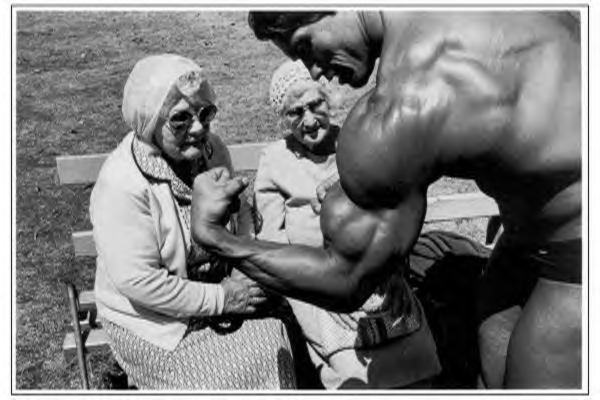When a young guy decides he’s tired of being scrawny he usually looks to the bodybuilding industry both as his ideal, and for advice. The bodybuilding community has done a lot of good over the years in helping guys become stronger, more confident men, however, one thing they did give us that isn’t helping guys become stronger, more muscular, and more ripped, is bulking.
For years now the battle of building muscle, because that’s exactly what it is for a lot of us, has been positioned – from a nutrition aspect – as a caloric issue. The same, for that matter, as the goal of cutting or burning fat. You increase your caloric intake if you want to bulk, and you decrease it when you want to cut.
Makes sense. You gain weight with more calories and you lose weight with less calories. Weight, however, isn’t the goal. Muscle is.
So while you’re stuffing your face and gaining bulk, are you really moving any closer to the body you want? And if bodybuilders bulk, wouldn’t those same rules apply to you and I?The answer to the first question, as I’m sure a lot of you (myself included) have found out the hard way, is no, you’re not getting any closer to building your ideal body if you’re bulking. While you’re getting bigger, you’re not getting any more ripped, cut, or shredded. And the same answer applies to the second question; no, the rules that bodybuilders adhere to can’t always apply to the skinny guy.
The reason why bulking won’t help you build your ideal body, and why bodybuilders can adhere to a different set of rules, has to do with your hormones, namely testosterone.
How Bulking Lowers Your Testosterone Levels
First, what is bulking?
Bulking, as we’ve already mentioned is consuming more calories than you’re burning on a daily basis. While protein accounts for a solid amount in size of your meals, carbohydrates will be your #1 calorie source by a mile if you’re adhering to a bulking protocol.
Why? Because carbohydrates are the least metabolically active calorie. That is, it’s very easy for your body to break down carbs in order to produce energy. When you eat a plate of pasta, you’ll almost immediately feel a boost in energy, which is then followed by a crash. This spike in energy has to do with insulin, but I’m getting ahead of myself here. Back to bulking.
So how does bulking negatively effect your lean muscle gains?
It does so through a very unproductive cycle.
Testosterone has many enemies. I can’t go through them all right now, but I have in the past (enemies of testosterone). For now, let’s focus on two: body fat and insulin.
Testosterone vs. Body Fat
As your body fat levels increase, your testosterone levels decrease.
As you begin to consume more and more calories, especially of the carbohydrate variety, you gain fat. It’s unavoidable. You may be feeding your muscle, but you’re also feeding your fat stores. As your body fat increases, and your testosterone levels decrease, the environment in your body becomes less conducive to building and repairing the muscle tissue you’re breaking down during your workout.
As the hormonal environment in your body becomes more feminine (with the increase in body fat and the lowering of your testosterone levels, your estrogen levels rise), and you don’t build as much muscle, your insulin health is diminished. That is, your body will store more carbohydrates as fat, rather than using them to feed your muscles.
Thus, the cycle…
The more fat you gain, the less testosterone you produce, the less muscle gain, and the more resistant to insulin you become.
And so, by constantly raising your insulin levels by having 5-6 high carbohydrate meals everyday, you begin to store fat like it’s nobody’s business and your body morphs into a round, soft, more muscular but less lean version of the guy you’d like to be.
You either become skinny fat, or fat fat.
Why Can Bodybuilders Bulk?
Testosterone is an essential hormone that men need to build muscle and burn fat. It also lowers depression, likelihood of cancer and so forth (when naturally produced by the body).
We’ve also talked about how bulking lowers your testosterone levels making it harder for your body to burn fat and build muscle. But what if you’re taking testosterone artificially? Continue Reading on Page 2>>>